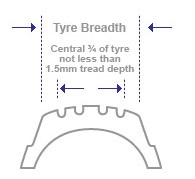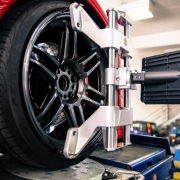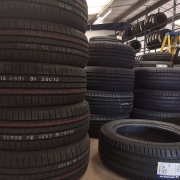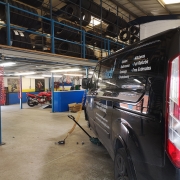Tyre care and maintenance is essential for safety, comfort, reliability and fuel efficiency of your vehicle. There are lots of reasons for tyre wear such as age, use, incorrect wheel alignment and poor road surface. It is important to look after your tyres and check them regularly to ensure you stay safe on the road.
There is no standard time for how long tyres should last before they need replacing. Generally, it is recommended that front tyres should last for approximately 20,000 miles and rear tyres should last 40,000. However, many factors influence the rate at which tyres degrade; including if your vehicle is front or rear wheel drive, driving conditions, weight carried and driving habits. Fast driving and bad weather conditions can cause your tyres to deteriorate much faster.
UK law requires your vehicle to be fitted with the correct type and size of tyre for your vehicle type and for the purpose it is being used. This means fitting the correct tyres and ensuring that they are inflated to the manufacturer’s recommended pressure.
If you think your tyres are getting close to needing replacements, or even just for peace of mind, just call in to Roadwheel for a free tyre check.
Our main checklist and tips for tyre safety are below:
Check the pressure regularly
Make sure your tyres are inflated to the recommended pressure. Tyres that are underinflated can overheat and cause damage to the tyre, and overinflated tyres can lead to poor vehicle handling and increase the risk of a blowout.
Tyres that are set to the incorrect tyre pressure will also need to be replaced more regularly as the tread will wear more quickly and unevenly. Under-inflated tyres will also increase fuel consumption as they have an increased rolling resistance and more fuel will be required to maintain the same speed.
The correct tyre pressures for your vehicle can be found in the vehicle handbook.
Make sure there is enough tread
When braking, your car relies on the tread on your tyres to grip the road and come to a stop in the shortest possible distance. Braking distance increases as tyre tread wears out so it’s important that you check them regularly to ensure you still have adequate tread on your tyres.
The legal minimum depth of the tread on your tyres is 1.6mm, across the central ¾ of the tread around the complete circumference of the tyre. (see image)

For safety, we strongly recommend that you replace your tyres before the legal limit is reached. Many vehicle manufacturers recommend replacing at 3mm. In wet weather, travelling at 50 mph with 1.6mm of tread, it takes an extra car length (8 metres) to stop than if your tread was 3mm.
It is also a legal requirement to ensure that tyres of different construction types are not mixed on the same axle (the two main tyre types are radial and cross-ply). Please ask Roadwheel to check your tyres if you are unsure.
Mixing brands and patterns of the same construction type is permissible depending on the vehicle type and manufacturers recommendation. Check your vehicle’s handbook, or ask Roadwheel to look this up for you.
Failing to replace your tyres before they reach this minimum limit could result in a hefty fine and penalty points on your licence.
Check for damage and unusual wear and tear
Tyres can get cuts and lumps caused by various things such as potholes or an impact with the kerb. If you notice any damage on your tyres, or your vehicle has been involved in an emergency manoeuvre like sudden heavy braking, you must have them checked as quickly as possible by a tyre specialist such as Roadwheel, as this sort of damage can lead to sudden tyre failure.
Keep your wheels aligned
Misalignment can affect car handling and can potentially make the car unsafe. A pre-suspension system inspection is part of the full alignment procedure; so helps to highlight any worn or damaged parts before they cause a more costly problem.
Many handling problems can be corrected by a four wheel alignment and with the geometry aligned properly to the motor manufacturers specifications, you can enjoy that new car feel!
By preventing premature tyre wear (and early tyre disposal), improving fuel economy and minimizing carbon emissions, it not only reduces the cost of motoring, but will help the environment too. Make sure to get your wheel alignment check periodically.
As always, if you’re in any doubt, get in touch and we will be happy to help!




